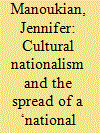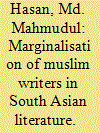| Srl | Item |
| 1 |
ID:
190106


|
|
|
|
|
| Summary/Abstract |
This article explores the historical moment in which the concept of a ‘national language’ began to spread among Ottoman Armenians. It does so by examining the establishment of educational associations aimed at changing the language practices of non-Armenophone Armenians in three parts of the Ottoman Empire: Aleppo, Kayseri and Diyarbekir. I argue that these associations were part of a larger cultural nationalist movement that gained momentum in urban centers beginning in the 1840s. Through an examination of the founding principles of the associations, I show how they sought to integrate Arabic-, Turkish- and Kurdish-speaking Armenians into the would-be national community by facilitating their acquisition of Armenian. Historiographically, this article shines a spotlight on the unexamined dynamics of Ottoman Armenian cultural nationalism and language-based identity formation.
|
|
|
|
|
|
|
|
|
|
|
|
|
|
|
|
| 2 |
ID:
117501


|
|
|
|
|
| Publication |
2012.
|
| Summary/Abstract |
Language education for home-background speakers or heritage learners has recently attracted significant attention in many countries. This case study reports on some of the findings on these speakers' backgrounds, profiles and language identities, utilising the data collected from a survey and focus group interview with 10 tertiary-level Japanese home-background speakers. We found that although all are classified as 'home-background speakers', they are a very heterogeneous group of students in terms of their backgrounds and language identities. This paper also discusses the implications of the findings for Japanese language education designed for this group of students, and points to the necessity of understanding the diverse needs of these students when educators are developing courses of study for them.
|
|
|
|
|
|
|
|
|
|
|
|
|
|
|
|
| 3 |
ID:
117598


|
|
|
|
|
| Publication |
2012.
|
| Summary/Abstract |
This article argues that there appears to be a pattern of disregarding the literary contributions of South Asian Muslim writers who produced English texts on a variety of topics. It then mainly contextualises Rokeya Sakhawat Hossain's English works in the tradition of South Asian writing in English to identify a continuous trend of undervaluing Muslim literary contributions in English in the region. The article thus argues for a re-assessment of the evaluation of this literary tradition, so that the many forgotten South Asian Muslim writers in English, including Rokeya, regain their long overdue recognition.
|
|
|
|
|
|
|
|
|
|
|
|
|
|
|
|
| 4 |
ID:
144694


|
|
|
|
|
| Summary/Abstract |
The purpose of this study is to examine the relationship between social and human capital regarding religious and language education among Japanese-Turkish families in Japan. The parents consider that it is their duty to pass on Islam to their children. Since Islamic education has a large influence on the children’s identity formation, parents give it a high priority. Concerning language, there is a tendency for the children to acquire Japanese as a primary language and English as a secondary language, despite the fathers’ desire to pass on Turkish. Turkish communities in Aichi Prefecture are composed of complex elements including place of origin, social and economic status, and ideologies of religious leaders followed. Intermarried families covered in this research obtain different social capital from each community. Even in the families who do not have the advantage of human capital, religious and language education is maintained in the community, where human and social capital mutually complement one another.
|
|
|
|
|
|
|
|
|
|
|
|
|
|
|
|